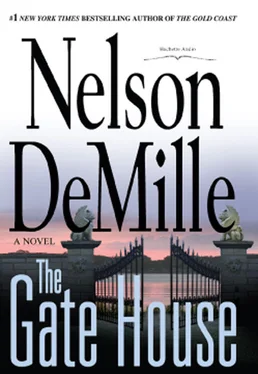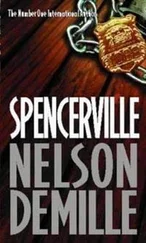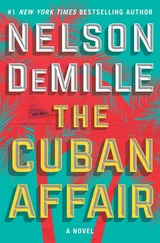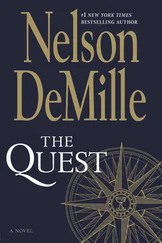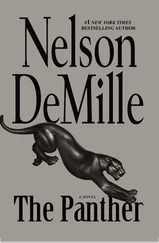“So do you.” In fact, she was, as I said, an attractive woman, and when she was younger, she’d looked like her mother in that wedding picture above the fireplace. As I also said, she looked enough like George so that I didn’t have to worry that she was my… what? Ex-wife’s grandfather’s illegitimate daughter, making her my children’s blood relative of some sort – and a possible Stanhope heir.
Actually, I realized that Elizabeth’s age would not comport with her mother’s World War II affair. But what if Augustus got in a post-war pop? Is that a Stanhope nose?
“Are you coming or going?” she asked.
“Huh? Oh… well, I never know.”
She smiled.
Stanhope mouth?
I said, “I’ve just come from your mother’s room. She looks well.”
“It’s very nice of you to visit.”
“Well… I’ve known your mother for a very long time.” I smiled and added, “We lived together once.”
Elizabeth returned the smile, then said, “John, I’m sorry about your father. I should have sent you a card.”
I replied, “I was at sea.”
“I know… that must have been very difficult for you.”
“It was.” And my mother made it more difficult. I wonder if she ever understood the irony of her calling me a son of a bitch.
Elizabeth said, “I meant to write to you when you got to London. I got your address from your mother.”
“Did you?” I wondered if Elizabeth asked for my address, or if it was offered. Probably the former, knowing Harriet. In any case, Elizabeth hadn’t written that condolence note, but if she had, what would she have said? Dear John, Sorry you couldn’t make your father’s funeral. Everyone was asking about you.
I was still feeling a little guilty after eight years, so I said, “I learned of my father’s death a month after it happened.”
She nodded.
I continued, “I’m going to visit his grave before I return.”
Again, she nodded and changed the subject by asking, “So, how is London?”
“Good.”
“How long are you staying?”
“I’m not sure.” I also wasn’t sure of my relationship with Elizabeth. Were we family friends as a result of me knowing her father and mother for decades? Or were we acquaintances because I’d hardly ever seen her, except now and then in the village and at a few social and family functions? I said, “Sorry to hear about your divorce.”
She shrugged and replied, “It was for the best.”
Elizabeth Allard, daughter of estate workers, had married well. His name was Tom Corbet, and he came from what’s called a “good family.” He’s a Yalie, like I am, and he worked on Wall Street, as I did, and in my past life I’d see him on the train now and then. Elizabeth, I recalled, used her maiden name for business, but socially she was Mrs. Corbet. Mr. and Mrs. Corbet had two children, a girl and a boy, both of whom must be in college now or graduated. Tom Corbet, by the way, was a crashing bore, and the only interesting thing about him was that he’d gone gay some years ago, so, yes, the divorce was probably for the best.
Elizabeth added, in case I didn’t know, “Tom has a boyfriend.”
“Right. Well…” That must have been very difficult for her when Tom sat her down and told her there was another man. I mean, that should have been her line.
She changed the subject and said to me, “Sorry about you and Susan.”
“Oh, did you hear about that?”
She suppressed a laugh and reminded me, “It was national news.”
“That’s right. It’s been so long.” Elizabeth owned three or four upscale clothing boutiques in the nearby villages, so I asked her, “How’s business?”
She replied, “Not too bad, considering the stock market has gone to hell, and people have been putting their money into hazmat suits and freeze-dried rations since 9/11 and the anthrax thing.” She smiled and continued, “Maybe I should carry designer gas masks.”
I smiled in return. I don’t usually notice women’s clothing, unless it’s really outrageous, but I recalled that Elizabeth used to dress conservatively, despite some of the weird stuff I’d seen in her shops years ago when Susan had dragged me into them. Today, however, Elizabeth had left her severely tailored business suits in the closet – or perhaps Tom took them – and she was wearing a frilly pink blouse that accentuated her tan, and a black silk skirt that didn’t reach her knees. Maybe she felt that her formerly mannish attire had been the reason that Tom… well, I shouldn’t speculate on that, but-
She interrupted my train of thought and said, apropos of her statement about hazmat suits and gas masks, “People are such wimps.” She asked, “What’s wrong with this country?”
“I don’t know. I just got here.”
I should also mention that Elizabeth was a local Republican activist, to the extent that Republicans around here engaged in any activity other than golf and drinking.
In any case, her politics, like her membership in The Creek Country Club and the Locust Valley Chamber of Commerce, may have been driven more by business than conviction. Nevertheless, Elizabeth’s affiliations had caused Ethel no end of grief and bewilderment, and I could imagine Ethel crying to George, “How could a child of mine be a Republican ?” Adding, “It’s your fault, George!”
Elizabeth asked me, “What are they saying in London?”
“They’re saying they’re next.”
She nodded.
Elizabeth Allard Corbet, by the way, had wavy chestnut hair that she wore shoulder length, nice big brown eyes, a nose with slightly flared nostrils (like George’s), and lush lips that, now and then, flashed a slightly amused smile. Bottom line, she was a good-looking woman with a cultured voice and manner – the result of being an estate brat.
Men, of course, found her attractive, though she never rang my bell (and apparently not Tom’s), and women, too, seemed to like her. Susan, I remembered, liked her.
On that subject, against my better judgment, I said, “I assume you know that Susan is back.”
She replied, without any silly pretense of ignorance, “Yes. I’ve seen her here a few times. We actually had lunch once.” She asked me, “Have you seen her?”
“No.”
“Do you plan to?”
“I don’t – but I probably will.”
There was a lot more to talk about on that subject, if I cared to, and I was sure Elizabeth, like her mother, had things to tell me about Susan. But the last thing I wanted was for people to be carrying messages and information back and forth between the estranged parties. So I dropped the subject and asked, “How are your children?”
“Fine. Tom Junior is a senior at Brown, and Betsy graduated Smith and is in an MFA program at Penn.”
“You must be very proud of them.”
“I am.” She smiled. “Except for their politics. I think bleeding-heart liberalism skips a generation. Mom, however, is delighted.”
I smiled in return.
She informed me, “Susan has filled me in on Edward and Carolyn.”
“Good.”
On the subject of genes versus environment, Elizabeth could be a little severe and strong-willed at times, like her mother, but mostly she was quietly pleasant and straightforward, like her father, with her father’s strong work ethic. And did I mention that she’d gone to Bryn Mawr, all expenses paid by her secret and perhaps reluctant godfather, Augustus Stanhope? Augustus’ rolls in the hay barn with Ethel had cost him a few more bucks than he’d figured, and possibly a few sleepless nights.
Things were different then, of course, in regard to social and sexual rules of behavior; but even today adultery isn’t acceptable, and carries a high price tag. Ask Susan Sutter. Or John. Or Frank Bellarosa… Well, he’s not talking.
Читать дальше
